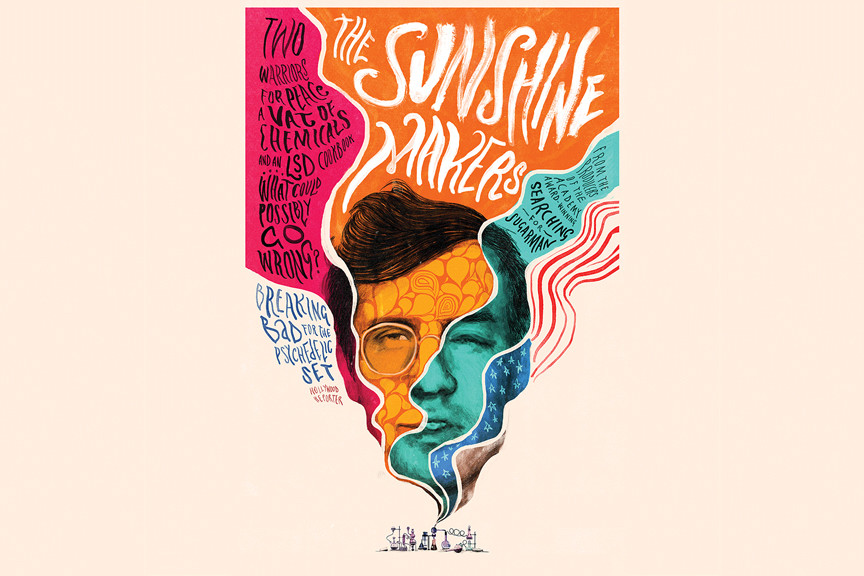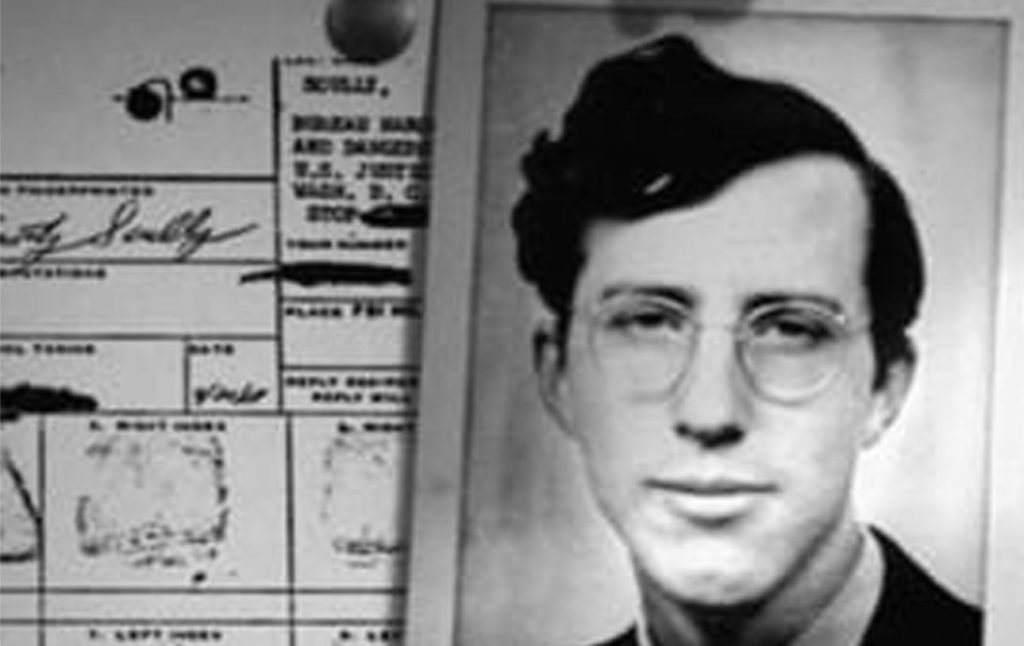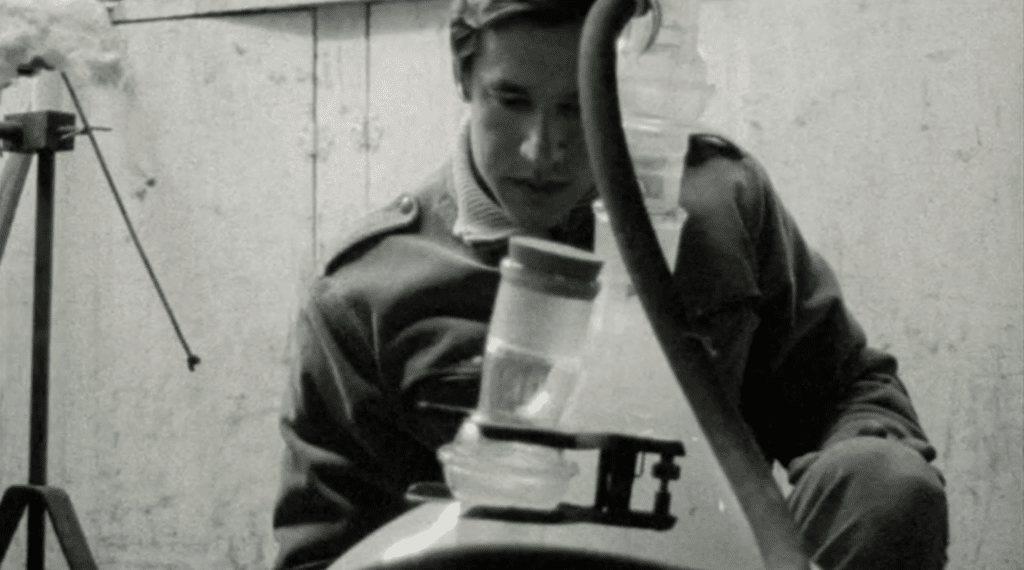Cosmo Feilding Mellen: Interview with a Sunshine Maker
1960’s. Two men. One goal. Turn the world on to LSD. An Interview with The SunShine Makers director, Cosmo Feilding Mellen.

Psymposia is a 501(c)(3) nonprofit research and media organization that offers critical perspectives on drugs, politics, and culture. We rely on contributions from our readers and listeners. Your support is vital to sustaining Psymposia.
Support Psymposia’s independent journalism on Patreon and help us drive the Mystery Machine! We’re a bunch of meddling kids who are unmasking the latest shenanigans on the psychedelics beat.
We got the chance to interview Cosmo Feilding Mellen, the director of The Sunshine Makers. It’s a movie described as being a real-life Breaking Bad for the psychedelic set.
The documentary tells the story of Nicholas Sand and Tim Scully, the unlikely duo at the heart of 1960s American drug counter-culture. United in a utopian mission to save the planet through the consciousness-raising power of LSD, these underground chemists manufactured a massive amount of acid, including the gold standard for quality LSD, ‘Orange Sunshine,’ all while staying one step ahead of the Feds.
Why’d you make the The Sunshine Makers?
I wanted to make a film with big and important ideas couched in a really engrossing story. I love crime movies, so a rise-and-fall drug dealer movie that also deals with the ideas of expanded consciousness, social transformation, and idealism ticked all the boxes.
Did you get to try Orange Sunshine while making the film?
I asked around, but I don’t think it exists anymore.
Tell us how you met Tim Scully and Nick Sand.
I first met Nick when I was 16. I live in the UK, and Nick came to dinner with my parents―my mother runs the Beckley Foundation, which does scientific research into psychedelics and how they work in the brain. Nick is one of those really cool guys who was really easy to talk to as a teenager. He even offered me some chemistry tips, which I thankfully declined…
Anyway, then a few years later my family and his family all ended up going to Burning Man together, and that’s when I really got fascinated with his story.
I only met Tim once I was developing this film project, through Connie my co-writer. I went to stay with him and his partner Alice in Mendocino. They live in the most beautiful spot.

Their goal was to make a quarter billion hits of LSD. How close did they get?
In terms of sheer numbers they didn’t get that close. They made millions of doses, but their plan was to scale up each run, and they calculated they would have the full 750,000,000 made within a couple of years…but obviously unforeseen obstacles prevented that from happening.
A recurring theme in the film is the role of LSD in changing the world. Nick recalls a trip where he was told, “Your job on this planet is to make psychedelics and turn on the world.” Tim later comments, “I still believed that LSD was a good thing, but I was no longer convinced that it was the solution to the world’s problems.” What’s your take on this?
There’s no doubt that LSD is an incredibly powerful substance and has the potential to bring about fundamental changes for the better in people who take it. But these substances need to be treated with great caution and respect. I hope that one day we will see psychedelics medicalized so that people can have access to psychedelics in an extremely safe and controlled environment. It doesn’t sound as fun as a Grateful Dead concert, but it would be a lot safer. And now the scientific evidence is really building up to make a great case for using psychedelics to treat a huge array of mental health problems.
How much money did they make?
I don’t know exactly. But less than you might imagine. They really weren’t in it for the money. I’m pretty sure Tim made more money from designing software than he ever did from making acid.
Scully was sentenced to 20 years in prison but got out in three. How?
Back then the prison system was actually a lot more forgiving than it is today. There was actually a big campaign to get Tim out of prison because he was such a peaceful man and brilliant scientist. They somehow managed to get his sentence cut in half to 10 years, and he was allowed out after only three due to good behavior.
If any cynics are asking: he definitely didn’t rat anyone out!
Nick Sand gets sentenced to 15 years in 1974, serves two, gets out on the loophole appeal, flees to Canada, manufactures LSD for another 20 years, get busted in 1990, flees again, gets busted again in 1996 for having 43 grams (430,000 doses), and serves 6 years. Was he the biggest LSD manufacturer at the time? Is he done?
I don’t know if he was the biggest in the world at that time, but he was caught with enough LSD to turn on the whole of Canada two times over, so he was pretty damn big in any case.
And yeah. Nick’s a law abiding citizen these days. He’s paid his dues and fought the good fight. He deserves a peaceful retirement.

What was their relationship like? Nick seems like a flamboyant Dionysian sex-pirate, Tim an introverted chemist. They seem unlikely partners.
Yes. The thing I love about this story most is how Tim and Nick are the most unlikely friends. They are kind of forced into a marriage of convenience based on their shared idealism that LSD can save the world, but apart from that, they have zero in common. And I find it particularly interesting to see how the two of them react differently to their ideals being put to the test.
What’s your favorite scene that was cut from the film?
You know what? There are SO many. Tim was the sound man for the Grateful Dead during the Acid Tests with the Merry Pranksters. That was amazing to learn about.
But I think my favorite scene was after LSD is banned and Owsley, Tim, and Nick all tried to make STP―a new designer drug that was still legal. Tim tries it with Owsley and takes far too much of it. He thinks he’s in Vietnam and can see helicopters flying over head. He tries to drive home but can’t handle it. Pulls over, drops his keys on the floormat, and then it takes him eight hours to find them again!
Then Nick makes loads of STP and sells it to the Hells Angels. But they then get angry with him because they thought they were buying LSD, and they chase him with a gun…the stories go on and on.
In your opinion, how much was them wanting to change the world, and how much was them wanting to be acid kings?
There’s no question that ego played a part, and it probably played a part in different ways and to different extents for each of them. But I honestly believe that both of them were deeply committed to psychedelics changing the world for the better.
Nick was obviously more of a natural outlaw, so he was probably more comfortable in that world, but I still really believe his heart was in the right place.
Was Orange Sunshine LSD or ALD-52? Was this the legal loophole Scully found to briefly get out of prison?
No. That was a loophole that he tried to use in the trial, and it actually got him a worse prison sentence because he was lying to the court!
Your mom Amanda Feilding is leading the way with LSD research at the Beckley Foundation. Can we assume you had a psychedelic-positive upbringing? What was that like?
Haha. Yeah, I guess I did, and I’m extremely grateful to my parents for that. They were always open about the potential benefits of psychedelics as long as they are treated with great caution and respect. I think it instilled in me a much safer attitude to drugs than a lot of people I know.
Although it was also kind of weird at school being known as the kid with the drug-campaigning parents! I remember when I was 15 our school had a drug education questionnaire to fill out, and one question asked “what do you think of when you think of LSD” and half the school put “Cosmo’s mum!”
Hey! Before you go… Psymposia is a 501(c)(3) non-profit media organization that offers critical perspectives on drugs, politics, and culture. We strive to ask challenging questions, and we’re committed to independent reporting, critical analysis, and holding those who wield power accountable.
Our perspectives are informed by critical analysis of the systemic crises of capitalism that have directly contributed to the unmitigated growth of addiction, depression, suicide, and the unraveling of our social relations. The same economic elite and powerful corporate interests who have profited from causing these problems are now proposing “solutions”—solutions which both line their pockets and mask the necessity of structural change.
In order for us to keep unpacking these issues and informing our audience, we need your continuing support. You can sustain Psymposia by becoming a supporter for as little as $2 a month.





